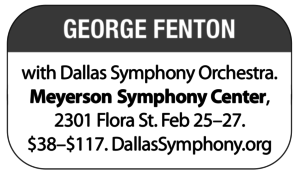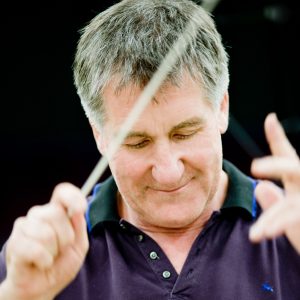Oscar-nominated composer George Fenton gets Dallas ready for the ‘Gay Super Bowl’
RICH LOPEZ | Staff Writer
lopez@dallasvoice.com
You might never think that a grand epic movie like Gandhi would have anything in common with the Kate Hudson rom-com Fool’s Gold. Dangerous Liaisons and Hitch? But from drama to comedy, the baton of Oscar-nominated film composer George Fenton has touched those films and many varied others. He’s definitely the versatile type.
“As a composer, you always project yourself into what meager little project you’re working on into a higher echelon,” Fenton says with a laugh.
This weekend, Fenton performs with the Dallas Symphony Orchestra for the Masters of Film Music concert, which features a selection of scores he has composed for films throughout the years. But after years of creating music and getting sizeable acclaim for it, he hints at some slight insecurity. The British composer is really just concerned if the audience is going to have a good time. Or he’s just a very humble guy.
“What I’ve tried to do is make a program that works sort of as a variety show,” he says. “I hope it makes a good evening. You never can quite tell what the dynamic of evening will be.”
Fenton has been nominated for five Oscars since 1983, for his original scores to Gandhi, Cry Freedom, Dangerous Liaisons and The Fisher King, as well as original song for Cry Freedom. With such illustrious cred, he’d likely have an opinion on this year’s crop of music nominees going into this weekend’s Gay Super Bowl, aka the Oscar ceremony. Maybe. But he’s not sharing.
“I’m not going to predict who wins. They are all worthy,” he says diplomatically. Fenton is more excited about the direction film scores are going. From the innovative modern tone of The Social Network to A.R. Rahman’s follow-up nomination for 127 Hours from his prior win for Slumdog Millionaire, Fenton sounds refreshed by “new” composers and basically those with balls to do something different.
are going. From the innovative modern tone of The Social Network to A.R. Rahman’s follow-up nomination for 127 Hours from his prior win for Slumdog Millionaire, Fenton sounds refreshed by “new” composers and basically those with balls to do something different.
“There hasn’t been enough courage to just take a shot at something different so I welcome this approach to movie music,” he says. “One of the great problems faced by people writing movie music is being employed to write to such a large expectation. Scores have generally been slightly stark for a while.”
In addition to the music performed with the DSO, film director Andy Tennant will provide guest narration. Known mostly for romantic comedies, Tennant has collaborated with Fenton on five movies, including Hitch, Fool’s Gold and Sweet Home Alabama. Fenton knows the films are “quite light,” but he figured on one thing.
“Well, since I asked him to come down and introduce things, I thought I’d better include some music from his films,” he laughs. “So I’ll likely have some music from Ever After and Anna and the King along with other films like Liaisons and Stage Beauty.”
He’ll also be introducing a new work for the show that strays away from the world of film. Fenton scored the popular mini-series Planet Earth and Blue Planet and in similar fashion, he’ll be playing parts from his latest work, “From a Disappearing World” inspired by the Arctic. Thinking it was from a newfound fascination with the nature work he had been doing, the four-part piece was merely representative of a trip he took there. Either that, or he was just figuring what to write for this performance.
“I was asked to write something for this show but I was like what kind of piece do I write?” he says.
He either underestimates himself or delivers that cheeky humor as only a Brit can do.
“When I came away from the trip, I thought I could write about its aspects so it’s four sketches that convey what it actually is,” he says. “I can’t imagine why I would do that.”
Since he wouldn’t predict which music Oscar nominee would win, he did deliberate on which of his nominations he should have won for.
“Well, in my humble opinion, all of them.”
Cheeky.
This article appeared in the Dallas Voice print edition Feb. 25, 2011.

















Isn’t the stereotype that most movie stars are gay and the Oscars are a gay super bowl outdated by at least four decades? It’s as outdated as the stereotype that most gay people are obsessed with movie stars and the Oscars.